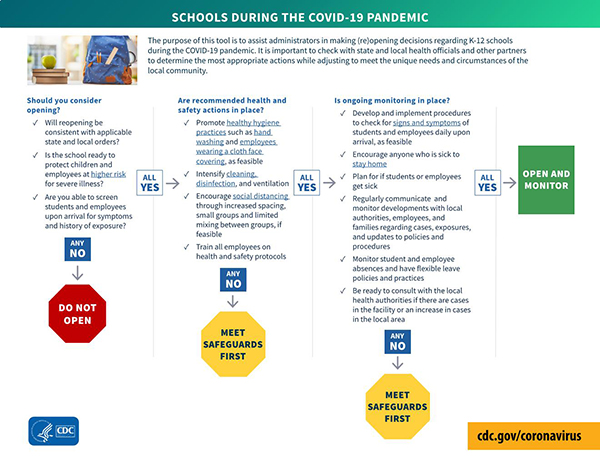Can You Reopen
Article | 11.23.2022By Sarah Proceviat, Management Consultant, Environmental, Wightman
In May, 2020 the Center for Disease Control (CDC) issued guidance for school administrators to help them understand and determine if K-12 schools should open (or re-open) during the COVID-19 pandemic. Despite this guidance being provided by the CDC, they still recommend that administrators consult with state and local health officials, as well as other partners, to determine actions which must be implemented while still being flexible enough to meet communities’ unique needs and circumstances. Although the guidance issued by the CDC appears to be clear and is reiterated in the content below, we must all understand that these are unprecedented times and almost everyone is trying to action plans, both personal and professional, that are new and not always perfect. When trying to sort out the what, where, when, why and how, we must try to take into consideration the impacts our plans and actions will have on those involved; and, that our progress towards the new norm (and old, for that matter) will take time and will require patience. We must remember that unexpected changes will occur and how we react to these, while consistently accommodating the various stakeholders involved in the decision-making processes (i.e. regulators, employees, students, parents, communities, etc.), will be of the utmost importance. Allow yourselves time to process how to move forward, address the requirements, and know that you are not in this alone.
Administrators should only consider opening K-12 facilities IF they can answer ‘YES’ to all of the following three items:
Should you even consider opening your facility(ies)?
- Can you open and remain consistent with applicable state and local orders?
- Can the school protect children and high-risk employees?
- Can you screen each child and employee daily upon arrival, for symptoms and/or history of exposure?
Answering ‘NO’ to any of these questions, should result in administrators keeping their facilities closed or determining workable solutions for use, to allow them to achieve a ‘YES’.
Do you have recommended health and safety actions in-place?
- Can you promote healthy hygiene practices (i.e. hand washing, cloth face-coverings)?
- Can you intensify cleaning, disinfection and ventilation throughout your facility?
- Can you allow for social distancing through use of increased spacing, smaller groups, and limiting mixing between groups?
- Can you have all employees trained on health and safety protocols?
Answering ‘NO’ to any of these items, should result in safeguards being implemented.
Will there be ongoing monitoring?
- Can you develop and implement procedures to check for signs and symptoms of students and employees, daily, upon arrival?
- Can you encourage and allow for anyone who is ill, to stay home?
- Can you develop a plan for students and/or employees who may fall ill while at the facility?
- Can you communicate and monitor developments with local authorities, employees and families regarding potential and/or confirmed cases, exposures and updates to policies and procedures?
- Can you monitor student and employee absences, and do you have flexible leave policies and practices?
- Can you consult with the local health authorities if you have any cases in your facility or an increase in cases in the local area?
Answering ‘NO’ to any of these items, should result in safeguards being achieved, before considering opening a facility.
Once you can answer ‘YES’ to all questions/items listed above, you are in a good position to open (or re-open) your facility and monitor progress. You will likely find that policies and practices will need to be updated as lessons are learned; work with your local authorities or others who have been going through similar experiences in their own areas/facilities to find a solution that will allow your facility to open while still protecting the health and safety of its students, employees, their families and the communities in which you reside.
Expertise
